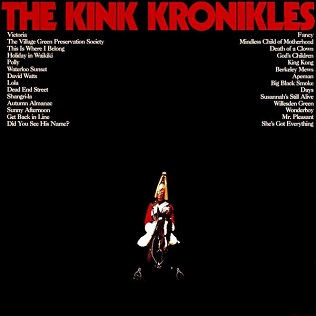
Face to Face is the fourth studio album by the English rock band the Kinks, released in October 1966. The album marked the band's shift from the hard-driving style of beat music that had catapulted them to international acclaim in 1964. Being their first album consisting entirely of Ray Davies compositions, it has also been regarded by critics as rock's first concept album. The album was included in Robert Christgau's "Basic Record Library" of 1950s and 1960s recordings, published in Christgau's Record Guide: Rock Albums of the Seventies (1981).
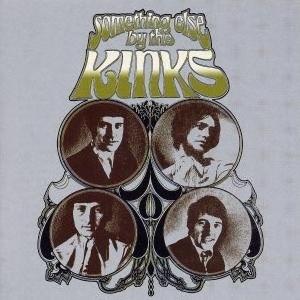
Something Else by The Kinks, often referred to as just Something Else, is the fifth UK studio album by The Kinks, released in September 1967. It marks the final involvement of American producer Shel Talmy in the Kinks' 1960s studio recordings; henceforth Ray Davies would produce recordings. Many of the recordings feature the keyboard work of Nicky Hopkins and the backing vocals of Ray's wife, Rasa. Two hit singles are included: "Waterloo Sunset" and "Death of a Clown". In 2012, the album was ranked #289 on Rolling Stone magazine's list of the 500 greatest albums of all time.

Muswell Hillbillies is an album by the English rock group The Kinks. Released in November 1971, it was the band's first album for RCA Records. The album is named after the Muswell Hill area of North London, where band leader Ray Davies and guitarist Dave Davies grew up and the band formed in the early 1960s.

Arthur is the seventh studio album by English rock band the Kinks, released in October 1969. Kinks frontman Ray Davies constructed the concept album as the soundtrack to a Granada Television play and developed the storyline with novelist Julian Mitchell; however, the television programme was cancelled and never produced. The rough plot revolved around Arthur Morgan, a carpet-layer, who was based on Ray and guitarist Dave Davies' brother-in-law Arthur Anning. A mono version was released in the UK, but not in the US. It is now available on the 2011 deluxe-edition re-issue.

Lola Versus Powerman and the Moneygoround, Part One, commonly abbreviated to Lola Versus Powerman, or just Lola, is the eighth studio album by British rock band the Kinks, recorded and released in 1970. A concept album, it is a satirical appraisal of the music industry, including song publishers, unions, the press, accountants, business managers, and life on the road. Musically Lola Versus Powerman is varied, described by Stephen Thomas Erlewine as "a wildly unfocused but nonetheless dazzling tour de force", containing some of Ray Davies' strongest songs.

"Lola" is a song written by Ray Davies and performed by English rock band the Kinks on their album Lola Versus Powerman and the Moneygoround, Part One. The song details a romantic encounter between a young man and a possible transvestite, whom he meets in a club in Soho, London. In the song, the narrator describes his confusion towards Lola, who "walked like a woman but talked like a man". Although Ray Davies claims that the incident was inspired by a true encounter experienced by the band's manager, alternative explanations for the song have been given by drummer Mick Avory.

"Apeman" is a 1970 song by the English rock band The Kinks. It was written by Ray Davies and appears on the album Lola Versus Powerman and the Moneygoround, Part One.
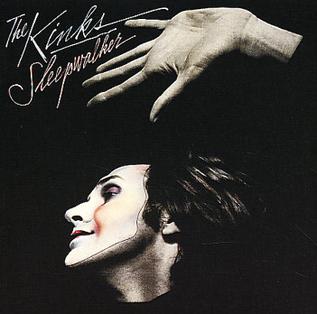
Sleepwalker is the fifteenth studio album by the English rock group, The Kinks, released in 1977. It marked a return to straight-ahead, self-contained rock songs after several years of concept albums. It is the first album in what critics usually call the "arena rock" phase of the group, in which more commercial and mainstream production techniques would be employed. The album also marks the last appearance of bassist John Dalton, who left the band during the recording sessions. Dalton plays bass on all songs on the album save for "Mr. Big Man". The lineup of The Kinks would be trimmed down significantly in 1977 following the album's release, as the brass section and backup singers were removed and the band returned to a standard rock band outfit.
"Got to Be Free" is a song written by Ray Davies and performed by British rock band the Kinks. It was released on their 1970 LP Lola versus Powerman and the Moneygoround, Part One, which included the Top 10 hit song "Lola". "Got to Be Free" plays a key role in the concept album, as the album borrows its first verse as an introduction, and closes with the full song. The song was also used in the first of the BBC's Play for Today series The Long Distance Piano Player (1970), which featured the song's own writer, Ray Davies, in the lead role.
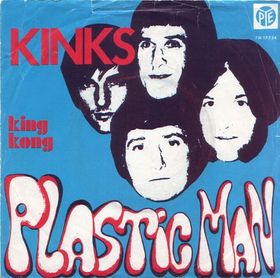
"Plastic Man" is a song written by Ray Davies and recorded by the Kinks in 1969.
"Rats" is a song written by Dave Davies and performed by The Kinks on their album Lola versus Powerman and the Moneygoround, Part One. It is the tenth song on the album, and has a duration of 2:40. John Dalton's bass work is a notable aspect of the song.
"Strangers" is a song written by Dave Davies and performed by British rock group the Kinks. It was released in November 1970 on the Kinks' LP record album Lola Versus Powerman and the Moneygoround, Part One, which is best known for producing the hit single "Lola". "Strangers" is one of two tracks written by Dave Davies on the album, the other being "Rats". He has said that the song is about an old school friend who died of a drug overdose.
Konk is the name of a recording studio and record label, established and managed by members of English rock band the Kinks.
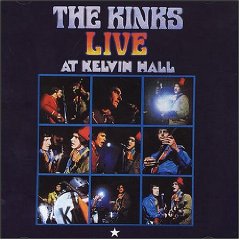
Live at Kelvin Hall is a 1967/68 live album by British rock group The Kinks. It was recorded at Kelvin Hall in Glasgow, Scotland, in early 1967. The album was released in August 1967 in the US, and January 1968 in the UK. Live at Kelvin Hall received mixed reviews upon release, and sold poorly.
"This Time Tomorrow" is the eighth track from the Kinks' 1970 album, Lola Versus Powerman and the Moneygoround, Part One. It was written by Ray Davies.

"The Road" is the opening track of Live: The Road, a 1988 live album by The Kinks. It was written by The Kinks' primary songwriter, Ray Davies.





